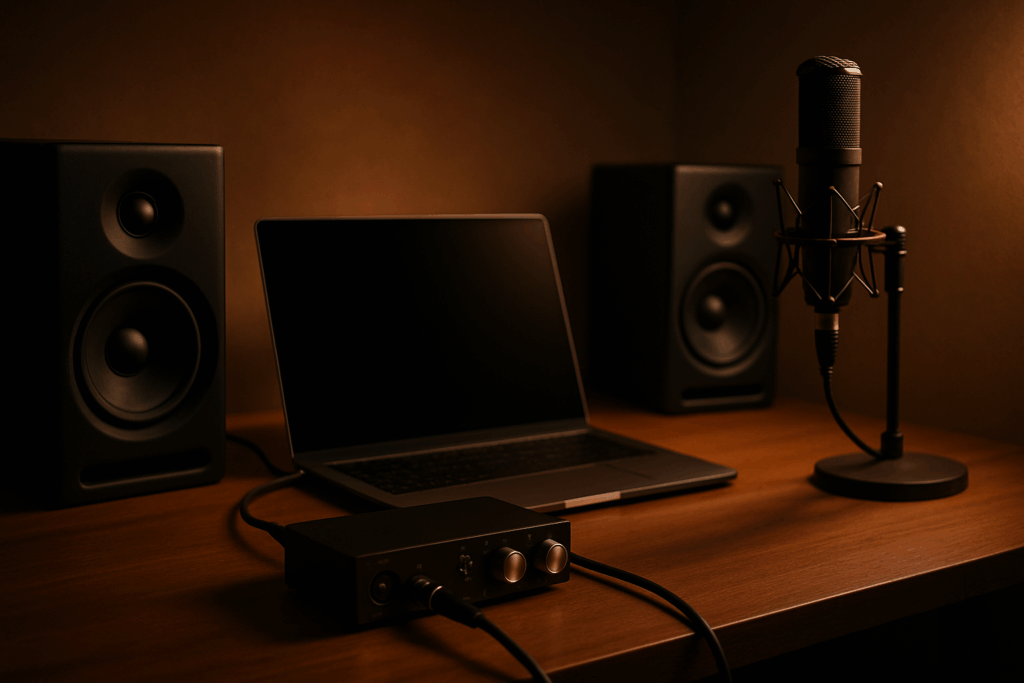Live music streaming in 2025 demands more than just good playing—you need great sound quality, low latency, and seamless integration with streaming tools. Whether you’re performing from your home studio or a live gig, the right audio interface can elevate your sound and give your viewers a pro-level experience. In this guide, we highlight the best audio interfaces for live streaming music in 2025, with a focus on new releases, updated features, and real-world musician needs.
What’s New in 2025?
The audio interface market continues to evolve. Here’s what’s changed this year:
- Improved USB-C and Thunderbolt 4 compatibility
- Lower-latency chipsets for tighter live monitoring
- Updated software bundles with more streaming-focused plugins
- AI-powered preamp control and auto-gain features
- Better integration with DAWs and platforms like OBS, Streamlabs, and Loopback
This guide focuses on the latest models or upgraded versions with these features in mind.
Why This Guide Is Different from Our Previous Roundup
In our original audio interface guide, we covered the best all-around options for live music streaming. This 2025 update takes a more performance-focused approach—prioritizing:
- Low-latency monitoring
- Multi-instrument support
- Pro-level audio for solo artists and bands
- Streaming-friendly software features
2025 Top Picks (With Real-World Streaming Context)
🔊 Focusrite Scarlett 4i4 Gen 4 (NEW)

Why it’s great in 2025: Redesigned preamps and USB-C power delivery make this interface more stable for longer sessions.
Pros:
- 4 inputs perfect for vocals and instruments
- Improved latency performance over Gen 3
Cons: - Still no onboard DSP
⚡ Universal Audio Volt 276

Why it’s great in 2025: Combines analog warmth with UA’s signature vintage compression—great for vocalists and acoustic artists.
Pros:
- Built-in analog compression
- Premium feel and sound
Cons: - Only 2 inputs
🎚️ MOTU M6 (2025 Edition)

Why it’s great in 2025: The new version includes firmware updates for even lower latency and improved OBS compatibility.
Pros:
- 4+ inputs with direct monitoring
- Color LCD meters and loopback support
Cons: - Slightly larger than M2/M4 models
🎛️ Audient EVO 8

Why it’s great in 2025: Smart gain continues to win fans, and the EVO Control app adds streaming-focused routing options this year.
Pros:
- 4 inputs, Smartgain, intuitive software
Cons: - Still lacks some advanced DSP
💡 PreSonus Studio 26c (Updated Drivers)

Why it’s great in 2025: Updated drivers improve stability for Windows streamers, and it includes Studio One Artist DAW.
Pros:
- Solid reliability, bundled DAW
Cons: - Limited visual feedback on interface
Bonus: Budget Pick for Beginners
🎤 Behringer UMC204HD

Why it’s still relevant in 2025: Affordable and consistent, this interface remains a go-to entry-level option.
Pros:
- Solid for small setups, under $100
Cons: - Higher latency than newer models
🎚️ But audio interfaces are just one piece. If you’re starting from scratch, our home studio guide will walk you through setup.
Best for Each Use Case
| Use Case | Best Pick |
|---|---|
| Solo streamers & vocalists | Universal Audio Volt 276 |
| Small bands or duos | Focusrite Scarlett 4i4 Gen 4 |
| OBS/Streamlabs integration | MOTU M6 |
| Portability & ease of use | Audient EVO 8 |
| Beginners on a budget | Behringer UMC204HD |
Pro Streaming Tips for Using an Audio Interface in 2025
- Use loopback routing (if available) to mix your mic and instrument into your stream feed.
- Set your buffer size to 128 or lower for near-zero latency (if your system allows).
- Avoid USB hubs—connect your interface directly to your computer’s main USB-C port for best stability.
- Pair with a DAW like Ableton Live or Logic if you want to add effects live before streaming.
- Test your gain and monitor levels thoroughly before going live—many new interfaces now support real-time metering via companion apps.
Final Thoughts
Streaming music live in 2025 is more accessible and higher quality than ever—if you’ve got the right audio interface. Whether you’re a solo artist, small band, or mobile performer, the picks above reflect the latest gear with the features musicians actually need. Choose based on your setup, budget, and the type of content you’re creating—and your streams will sound better than ever.
